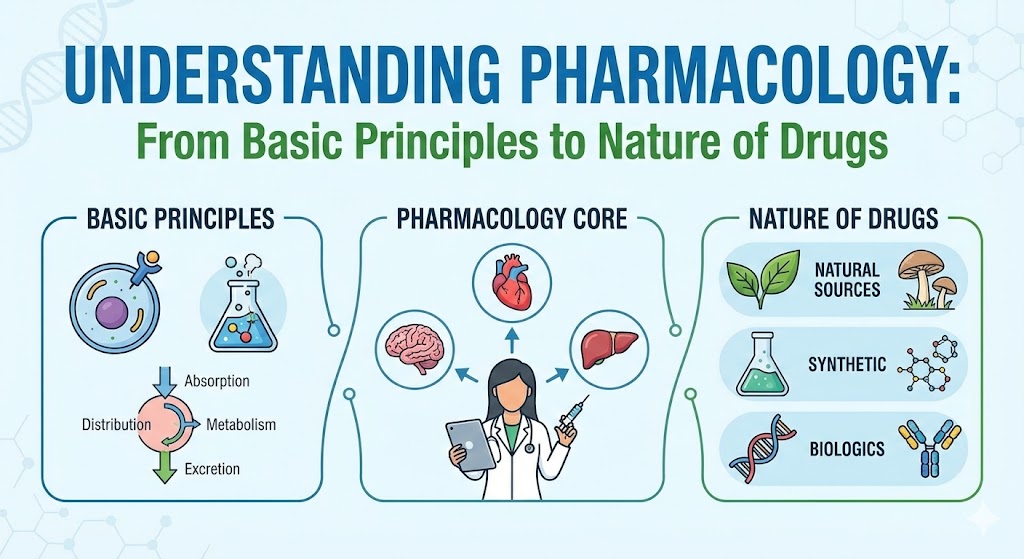Introduction
Pharmacology is a multidisciplinary field that explores the interactions between chemicals and biological systems. It encompasses various sub-disciplines, including medical pharmacology, toxicology, pharmacokinetics, and pharmacodynamics. This article aims to provide an overview of these areas and delve into the nature of drugs, their molecular characteristics, and how they interact with biological receptors.
The Scope of Pharmacology
Medical Pharmacology
Medical pharmacology focuses on the use of chemicals in the prevention, diagnosis, and treatment of diseases, particularly in humans. It aims to understand how drugs can be effectively used to alleviate symptoms, cure diseases, or even prevent them altogether.
Toxicology
Toxicology, on the other hand, studies the adverse or undesirable effects of chemicals on biological systems. This area is crucial for assessing the safety profile of drugs and understanding their limitations.
Pharmacokinetics
Pharmacokinetics deals with how the body affects drugs, including processes like absorption, distribution, metabolism, and excretion. Understanding pharmacokinetics is essential for determining the appropriate dosage and administration route for drugs.
Pharmacodynamics
Pharmacodynamics explores the actions of drugs on the body, including their mechanisms of action and their therapeutic and toxic effects. This knowledge is vital for predicting how drugs will interact with biological systems and for developing new therapeutic agents.
The Nature of Drugs
Types of Drugs
Drugs can be classified based on their origin and chemical structure. They may include:
- Inorganic ions
- Nonpeptide organic molecules
- Small peptides and proteins
- Nucleic acids
- Lipids
- Carbohydrates
Some drugs are derived from plants or animals, while others are partially or entirely synthetic. Alkaloids, which are often found in nature, are molecules with a basic pH, usually due to amine groups in their structure.
Optical Activity and Enantiomers
Many biologically important molecules and drugs are optically active, meaning they contain one or more asymmetric centers and can exist as enantiomers. These enantiomers often differ significantly in their affinity for biological receptors and may also be metabolized at different rates, leading to varying clinical outcomes.
Size and Molecular Weight
The molecular weight of drugs can range from as low as 7 (e.g., lithium) to over 50,000 (e.g., thrombolytic enzymes, antibodies). Most drugs have molecular weights between 100 and 1000. Drugs smaller than 100 are usually not selective enough, while those larger than 1000 are often poorly absorbed and distributed.
Drug-Receptor Bonds
Drugs can bind to receptors through various types of chemical bonds, including:
- Strong covalent bonds (usually irreversible)
- Weaker electrostatic bonds
- Even weaker interactions like hydrogen, van der Waals, and hydrophobic bonds
Conclusion
Pharmacology is a complex field that integrates various disciplines to understand the interaction between drugs and biological systems. From the basic principles of pharmacokinetics and pharmacodynamics to the intricate nature of drugs and their development, pharmacology continues to be a cornerstone in the advancement of medical science.
Bibliography: Katzung & Trevor’s Pharmacology: Examination & Board Review, 10e Trevor AJ, Katzung BG, Kruidering-Hall MM, Masters SB. Trevor A.J., & Katzung B.G., & Kruidering-Hall M.M., & Masters S.B.(Eds.),Eds. Anthony J. Trevor, et al.
Please visit the following page for more information:
Medical Disclaimer
The medical information on this post is for general educational purposes only and is provided by Pharmacology Mentor. While we strive to keep content current and accurate, Pharmacology Mentor makes no representations or warranties, express or implied, regarding the completeness, accuracy, reliability, suitability, or availability of the post, the website, or any information, products, services, or related graphics for any purpose. This content is not a substitute for professional medical advice, diagnosis, or treatment; always seek the advice of your physician or other qualified health provider with any questions you may have regarding a medical condition and never disregard or delay seeking professional advice because of something you have read here. Reliance on any information provided is solely at your own risk.

